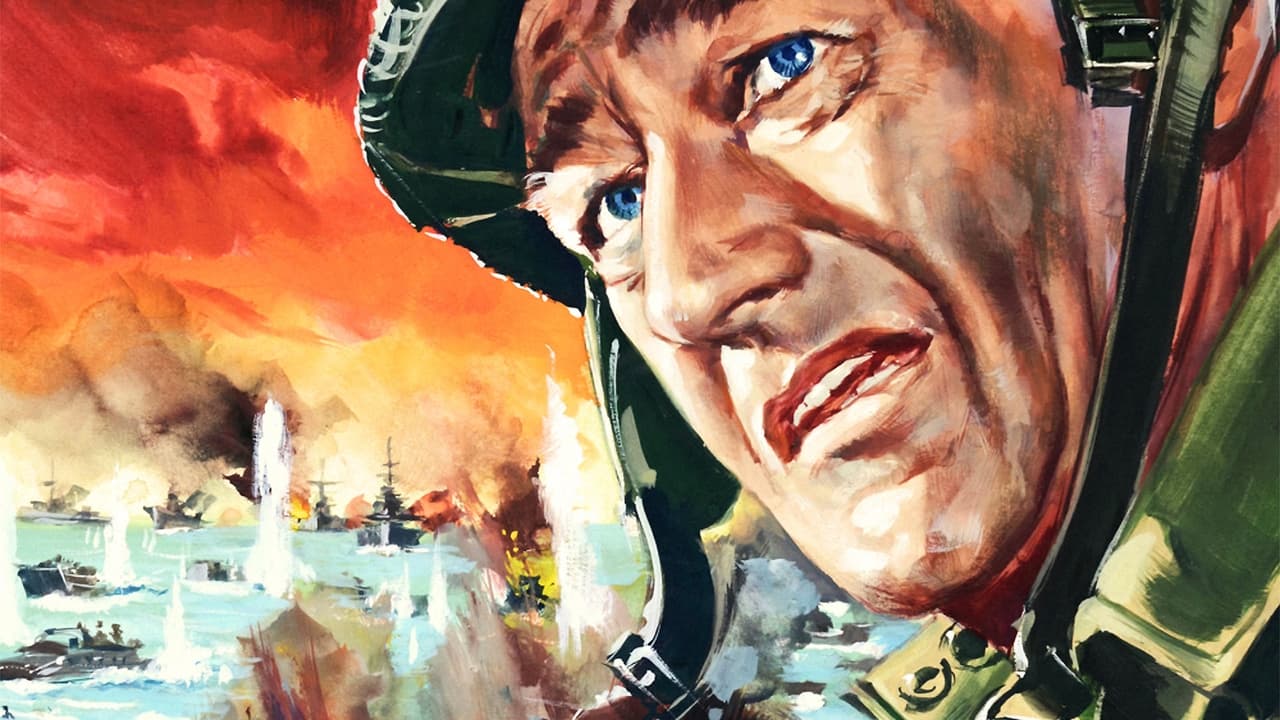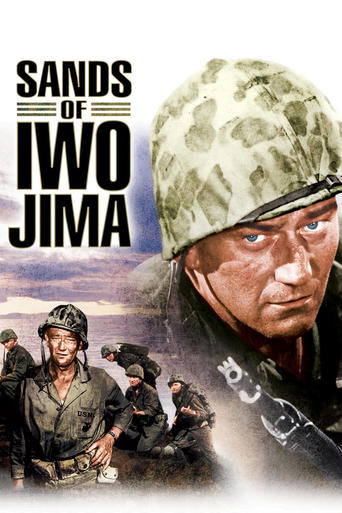

Highly Overrated But Still Good
... View MoreDreadfully Boring
... View MoreGreat movie! If you want to be entertained and have a few good laughs, see this movie. The music is also very good,
... View MoreThis movie was so-so. It had it's moments, but wasn't the greatest.
... View MoreTension simmers between a tough-as-nails sergeant and the soldiers who he eventually leads into battle at Iwo Jima in this iconic World War II drama. John Wayne is very good as the moody sergeant with a beating human heart behind his tough exterior and John Agar is excellent as the private who clashes personalities with him the most. The son of a legendary military leader, Agar has to wrestle with the fact that he feels obliged to fight regardless of personal preference. He also has a touching scene in which he waxes poetic about marriage and fatherhood as ways to prove that one's life meant something. None of the other characters or performances are on the same level as Wayne and Agar (though Forrest Tucker has the occasional strong moment) and considering how blatantly flag-waving a film it is, it is understandable that 'Sands of Iwo Jima' might not appeal to some viewers. The two main characters have more dimension than the typical patriotic soldiers out there though, and the film is technically well produced. There are some great montages and gradual dissolves and the film seamlessly incorporates actual battle footage into the filmed action. With lots of zooms and tracking shots, the film is hardly static either. Some of the special effects (backdrops as Wayne drives along) show their age, but this stacks up rather well all things considered.
... View More"Sands of Iwo Jima" is a patriotic war film of the type that was popular (in both America and Britain) in the years following the end of World War II. Although the war itself had been over for four years when it was made, by 1949 the Cold War had started, and the thought that America might soon be at war again may have been a factor in the popularity of films of this sort. It is notable that few patriotic war films were made in the immediate aftermath of World War I when it was widely, if erroneously, believed that the horrors of the trenches had made war a thing of the past; anti-war films were more popular during this period. Like a number of such films it follows a group of fighting men- in this case a squad of United States Marines- through the war, typically starting with their training and ending with some heroic engagement in which the unit acquit themselves with distinction. The engagement in this case is the famous Battle of Iwo Jima of February/March 1945 in which American forces succeeded in seizing control of a Japanese-held island, albeit at the cost of heavy casualties. A photograph of US Marines raising the Stars and Stripes over the island became an icon of American patriotism; this event is recreated in the film making it a "flag-waving" movie in the most literal sense. (The value of this victory has been doubted. It has been pointed out that Iwo Jima had little strategic value and that, given their overwhelming superiority in numbers and their complete control of the surrounding sea and air, it would have been virtually impossible for the Americans to have lost the battle. Needless to say, doubts of this nature are never raised in the film). We first meet the squad during training in New Zealand, where they are being put through their paces by tough-but-fair Sergeant John Stryker. Not all the men, however, appreciate Stryker's rigorous training methods. He is especially disliked by two of them. Private Al Thomas, who has tangled with Stryker in the past, regards him as tough-but- unfair. Private Peter Conway, who has joined the Marines for the sake of family tradition rather than out of any genuine enthusiasm, loathes him for more complicated reasons. Conway's father, who has been killed earlier in the war, was himself an officer in the Marines. Stryker served under him and greatly admired him, but Conway junior despised his father, whom he saw as cold and unfeeling, and transfers his hatred to Stryker, whom he sees as a man of a similar stamp. Needless to say, both Thomas and Conway eventually prove themselves heroes when the squad go into battle. A subplot deals with Conway's courtship of, and marriage to, Allison, a New Zealand girl. (At least, I presume Allison is a New Zealander, although Adele Mara plays her with an American accent). An attempt is made to give Stryker himself some sort of a back-story; we learn that he went through a traumatic divorce before the war and that he has become an alcoholic as a result. The scriptwriters, however, seem to regard his tendency to drink alcohol to excess as a mere personal foible which in no way detracts from his efficiency as a soldier. When his squad come across him dead drunk in the street they all- even those who dislike him- combine to hide him and protect him from the military police, never stopping to think whether a habitual drunkard is really the sort of man they want to lead them in combat. Today the battle scenes would seem fairly feeble, not only in comparison with something like "Saving Private Ryan" but also in comparison with later war films from the sixties and seventies. In the late forties, however, they probably seemed effective enough and aroused greater tension than comparable films made during the war itself. The casting of John Wayne, who himself had never served in the armed forces and was considered a draft dodger by some, was controversial, but the film nevertheless brought him his first Academy Award nomination for "Best Actor in a Leading Role". Wayne had a limited range as an actor, but could be very good within that range, as he is here, making Stryker entirely credible as a man whom others would willingly follow into battle, despite his personal weaknesses. He lost out on "Best Actor", however, to Broderick Crawford as Governor Stark in "All the King's Men"; ironically this was a role which Wayne himself had been offered but refused. "Sands of Iwo Jima" is a "Marmite Film" that will continue to divide opinion, even more than sixty years after it was made. Pacifists will doubtless hate it as a glorification of war. American patriots, especially those who share John Wayne's conservative politics, will love it as a celebration of heroism in a just cause. It is, however, overall a well-written, well-acted and generally well-made picture of men at war, if rather too gung-ho for my tastes. 7/10
... View MoreTwenty years before George C. Scott said basically the same thing in "Patton", a Marine lieutenant said it in this, a post-war made flag waver of why we fight. John Wayne is a tough marine sergeant determined to turn his troop into a battalion to be reckoned with. He knows that they aren't dealing with a weak enemy and doesn't care that his men for the most part can't stand him. Something else is more important.Actually, Wayne has their best interests at heart, and when the film moves from combat training into action, the men pick up on it. It's all about looking out for each other, finding brotherhood in the cause, which the men don't realize until they see one of the others killed, and it is then that they turn into the men that Wayne was out to see them made into.This was box-office gold for Wayne, Oscar Nominated for his tough performance. At first glance, it is no different than most of the performances he had been playing since stardom hit him with "Stagecoach", but he is playing a much more complex character than normal. Wayne is a drunk, a father figure, a sentimentalist, a bully. But each of those has causes, intentions and effects, so he's simply more than a hero. There are too many similar characters among his troop to single anybody out, although Forrest Tucker deserves mention as the tough Thomas who has lots of reasons for hating Wayne but will find out that he needs him and vice versa. Stock war footage is obvious, but what is newly filmed for this makes for exciting battle sequences.
... View MoreDuring World War II, bombastic Marine Sergeant John Wayne (as John M. Stryker) trains a diverse (for the time) group of younger men for the tough "Sands of Iwo Jima" battle. Deserted by his own family, Mr. Wayne develops fatherly affections for his recruits, while lambasting them. Wayne gets close to arrogant John Agar (as Peter "Pete" Conway), while bickering with him. You've got to wonder why Wayne trained anyone, when he could have easily won the battle of Iwo Jima by himself. Come to think of it, why didn't we just send Wayne to knock off Hitler, and be done with it? Since this film is so ludicrous, I decide to ask my aunt about the actors. Wayne was "a very handsome man," "opinionated" and "in charge" most of the time. Eventfully, he became the character "John Wayne". Agar grew a little too fond of alcohol as time went on, although "he was a very nice man." They would meet for drinks in beautiful downtown Burbank. If Agar had a few too many, and became "nasty," my aunt would sing a few choruses of "On the Good Ship Lollipop" to quiet him down. Okay, she said, "to shut him up!" Now that I see he was divorcing "Mrs. Agar", I know why that technique worked.Back to the film It was nominated for several "Academy Awards" and is nicely produced. Several of the actual Marines serving at Iwo Jima appear. Director Allan Dwan, whose career date back to many successful "silent movie" features, brings a lot of experience to the film; he works well with Wayne and gets a more comfortable budget than usual, from the studio ("Republic"). Wayne solidified his superstar status with "Sands of Iwo Jima" and his iconic characterization received a "Best Actor" notice; but, see his "She Wore a Yellow Ribbon" (also 1949) for a better overall performance.****** Sands of Iwo Jima (12/14/49) Allan Dwan ~ John Wayne, John Agar, Forrest Tucker, James Brown
... View More